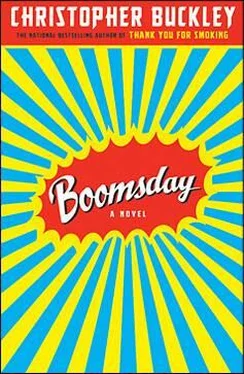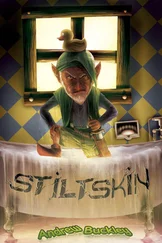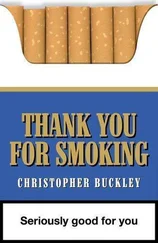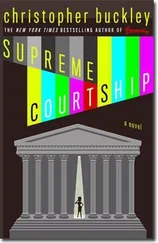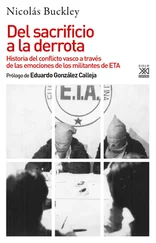Christopher Buckley - Boomsday
Здесь есть возможность читать онлайн «Christopher Buckley - Boomsday» весь текст электронной книги совершенно бесплатно (целиком полную версию без сокращений). В некоторых случаях можно слушать аудио, скачать через торрент в формате fb2 и присутствует краткое содержание. ISBN: , Жанр: Современная проза, на английском языке. Описание произведения, (предисловие) а так же отзывы посетителей доступны на портале библиотеки ЛибКат.
- Название:Boomsday
- Автор:
- Жанр:
- Год:неизвестен
- ISBN:0-446-19493-X
- Рейтинг книги:5 / 5. Голосов: 1
-
Избранное:Добавить в избранное
- Отзывы:
-
Ваша оценка:
Boomsday: краткое содержание, описание и аннотация
Предлагаем к чтению аннотацию, описание, краткое содержание или предисловие (зависит от того, что написал сам автор книги «Boomsday»). Если вы не нашли необходимую информацию о книге — напишите в комментариях, мы постараемся отыскать её.
Reviewed by Judy Budnitz
Does government-sanctioned suicide offer the same potential for satire as, say, the consumption of children? Possibly. One need only look to Kurt Vonnegut's story "Welcome to the Monkey House," with its "Federal Ethical Suicide Parlors" staffed by Juno-esque hostesses in purple body stockings. Or the recent film "Children of Men," in which television commercials for a suicide drug mimic, to an unsettling degree, the sunsets-and-soothing-voices style of real pharmaceutical ads. Now, Christopher Buckley ventures into a not-too-distant future to engage the subject in his new novel, Boomsday.
Here's the set-up: One generation is pitted against another in the shadow of a Social Security crisis. Our protagonist, Cassandra Devine, is a 29-year-old public relations maven by day, angry blogger by night. Incensed by the financial burden soon to be placed on her age bracket by baby boomers approaching retirement, she proposes on her blog that boomers be encouraged to commit suicide. Cassandra insists that her proposal is not meant to be taken literally; it is merely a "meta-issue" intended to spark discussion and a search for real solutions. But the idea is taken up by an attention-seeking senator, Randy Jepperson, and the political spinning begins.
Soon Cassandra and her boss, Terry Tucker, are devising incentives for the plan (no estate tax, free Botox), an evangelical pro-life activist is grabbing the opposing position, the president is appointing a special commission to study the issue, the media is in a frenzy, and Cassandra is a hero. As a presidential election approaches, the political shenanigans escalate and the subplots multiply: There are nursing-home conspiracies, Russian prostitutes, Ivy League bribes, papal phone calls and more.
Buckley orchestrates all these characters and complications with ease. He has a well-honed talent for quippy dialogue and an insider's familiarity with the way spin doctors manipulate language. It's queasily enjoyable to watch his characters concocting doublespeak to combat every turn of events. "Voluntary Transitioning" is Cassandra's euphemism for suicide; "Resource hogs" and "Wrinklies" are her labels for the soon-to-retire. The opposition dubs her "Joan of Dark."
It's all extremely entertaining, if not exactly subtle. The president, Riley Peacham, is "haunted by the homophonic possibilities of his surname." Jokes are repeated and repeated; symbols stand up and identify themselves. Here's Cassandra on the original Cassandra: "Daughter of the king of Troy. She warned that the city would fall to the Greeks. They ignored her… Cassandra is sort of a metaphor for catastrophe prediction. This is me. It's what I do." By the time Cassandra asks Terry, "Did you ever read Jonathan Swift's 'A Modest Proposal'?" some readers may be crying, "O.K., O.K., I get it."
Younger readers, meanwhile, may find themselves muttering, "He doesn't get it." The depiction of 20-somethings here often rings hollow, relying as it does on the most obvious signifiers: iPods, videogames, skateboards and an apathetic rallying cry of "whatever."
But Buckley isn't singling out the younger generation. He's democratic in his derision: boomers, politicians, the media, the public relations business, the Christian right and the Catholic Church get equal treatment. Yet despite the abundance of targets and the considerable display of wit, the satire here is not angry enough – not Swiftian enough – to elicit shock or provoke reflection; it's simply funny. All the drama takes place in a bubble of elitism, open only to power players – software billionaires, politicians, lobbyists, religious leaders. The general population is kept discretely offstage. Even the two groups at the center of the debate are reduced to polling statistics. There are secondhand reports of them acting en masse: 20-somethings attacking retirement-community golf courses, boomers demanding tax deductions for Segways. But no individual faces emerge. Of course, broadness is a necessary aspect of satire, but here reductiveness drains any urgency from the proceedings. There's little sense that lives, or souls, are at stake.
Even Cassandra, the nominal hero, fails to elicit much sympathy. Her motivations are more self-involved than idealistic: She's peeved that her father spent her college fund and kept her from going to Yale. And she's not entirely convincing as the leader and voice of her generation. Though her blog has won her millions of followers, we never see why she's so popular; we never see any samples of her blogging to understand why her writing inspires such devotion. What's even more curious is that, aside from her blog, she seems to have no contact with other people her own age. Her mentors, her lover and all of her associates are members of the "wrinklies" demographic.
Though I was willing for the most part to sit back and enjoy the rollicking ride, one incident in particular strained my credulity to the breaking point: Cassandra advises Sen. Jepperson to use profanity in a televised debate as a way of wooing under-30 voters, and the tactic is a smashing success. If dropping an f-bomb were all it took to win over the young folks, Vice President Cheney would be a rock star by now.
